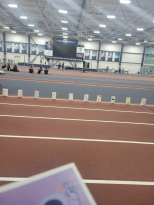A Different Kind of Classroom
UNIVERSITY PARK — Sarah Penn, a senior at Penn State, is a teaching assistant for the meat processing class that is part of the curriculum for all animal studies majors in the college of agriculture.
The 16,000 square foot Meats Lab, located next to Beaver Stadium, is equipped for conducting livestock slaughter and meat cutting and processing in support of meats teaching, research and extension. This allows students to experience the live slaughter and meat packaging process for farm animals such as pigs and cows.
 Sarah Penn points to meat from a lamb that is kept in the Penn State University Meat Laboratory. Photo by Kristin Consorti
Sarah Penn points to meat from a lamb that is kept in the Penn State University Meat Laboratory. Photo by Kristin ConsortiPenn originally took the class because she hopes to one-day work in either the horse or cattle insemination process after college.
Penn was asked to be a teaching assistant because of her work in the class as a junior. When she watched her first slaughter she said she was a little nervous, but believes that the animals do not feel anything, and it’s an important process of the meat industry.
First time students often get excited, she says. One student volunteered to cook the meat and completely burned it because she was unaware of how to actually cook the meat. Sarah laughs, as she recalls the entire class ate the burnt meat anyway.
The animals come into the lab, and get at least 48 hours to adjust to the environment, due to FDA regulations. After each one is individually shuffled into a department that electrocutes the animal so they feel minimal pain, the animal is the hung by legs, where the rest of slaughtering process takes place.
The Meat Lab has over 1200 square feet of refrigerated space including freezers and coolers for storage and processing of carcasses, cuts and processed meat products. Separate refrigerated and frozen storage areas are available for research projects. The Meat Lab operates as a USDA inspected meat processing facility.
The retail area of the unit provides an outlet for most of the meat product resulting from the various activities. Sales are held most Fridays between 9:30AM and 3:00PM and are open to the public. Special sales events organized by student clubs are also arranged through the facility, often allowing the students in those organizations to gain meat processing and marketing experience.
The Slaughtering Process
Sarah explains the slaughtering process that takes place when they have many pigs that arrive on campus. The pigs are brought in and then electricuted before being bled out and cut apart.
Goals for After College
After college Penn hopes to work in artificial insemination of large live stock animals such as horses and cows, which helps with population growth and consumer needs such as dairy and meat.








